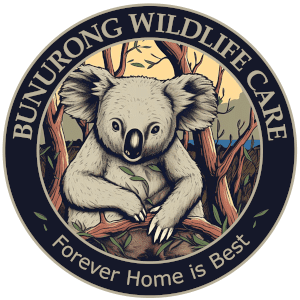
Wildlife Victoria 24/7
Contact Wildlife Victoria to get emergency help.
They are set up to efficiently coordinate & deploy rescuers.

Safety First
Ensure that you prioritize your own safety when at the scene of an ill, injured or orphaned animal.
Wildlife injuries often occur on busy roads at dawn & dusk.
Seemingly docile animals may react suddenly & aggressively if they feel threatened.
DO NOT APPROACH snakes, monitor lizards (goannas), bats (flying-foxes or microbats), large macropods (kangaroos or wallabies), koalas or raptors (eagles, falcons or hawks). These animals require specialist handling and MUST be rescued by trained wildlife rescuers. Observe the animal from a safe distance and call for rescue assistance.
For more information on specific species, please visit either:
- WIRES – Wildlife Species Information
- Wildlife Victoria – Wildlife Fact Sheets (PDF format)
Keep The Animal Safe
When you can do so safely, remove any threat to the animal’s welfare, including keeping people & pets away to minimise stress to the animal.
Whenever possible, it is best to leave native animals in the wild, including leaving healthy young animals, such as bird chicks, with their parents.
Exact Location
You can help rescuers by being very accurate when providing the location of the animal. Nearby crossroads. Distance to landmarks / signs. Take a photo at the location showing recognizable landmarks such as road signs or buildings. A screenshot showing a dropped location pin & the Plus Code on a map. The deployed rescuer may call you for more information & this can be very helpful. Refer to our separate page on Plus Codes.
Young animals can possibly be reunited with their parents, if we know the exact location the animal was found. Many native animals are very territorial, and it is critical that we release them where they were found, when they are ready to release, to ensure their best chance of survival.
Rescue & Transport
Sick or injured animals need to be vet assessed before coming into care. It is critical to get sick and injured wildlife vet treatment as quickly as possible, and vets will accept wildlife free of charge.
If the sick or injured animal is safe to contain (e.g. birds), gently contain the animal and keep it in a warm, dark, quiet place, and transport it to the nearest vet. Please call the vet to let them know you are coming and do not give the animal any food or water, unless instructed to by a vet or experienced wildlife carer.
Improper rescue can hurt or distress the animal and the rescuer, which is why rescue volunteers are appropriately trained, so please exercise caution when handling wildlife. Ensure you are wearing appropriate PPE, including gloves when touching any animal, gently place a towel over the animal and place it in a ventilated box with a lid and transport it carefully to the nearest vet or wait for the rescuer to arrive. If you are containing a possum, please take additional precautions. Wear a jacket or long sleeves to reduce the risk of being scratched and wear a face mask in addition to gloves when using a towel to pick up the animal. After placing the animal in the box, you should immediately wash your hands or use hand sanitiser.
The Law
It is against the law to keep native animals taken from the wild. They must be passed on to a Vet or an authorised Wildlife Shelter or Foster Carer.
Credit: Some portions of the text used on this page have been taken from the NSW based WIRES ‘Emergency Wildlife Rescue Advice’ website page, which can be found here: wires.org.au/emergency-rescue-advice
